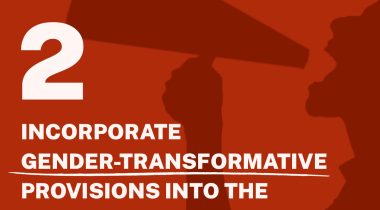
Nick Shaxson ■ OECD threatens Bahamas with blacklisting, Bahamas wilts

The Spanish newspaper El Mundo is running an article in Spanish, whose headline translates as “If Bahamas goes on like this, it will go onto the G20 blacklist” – and the text in quote marks comes from Pascal Saint-Amans, head of tax at the OECD, the club of rich countries.
The Bahamas has been in the news recently: first, we wrote a scathing blog about how the Bahamas was a big hole in global efforts to build transparency, refusing to participate effectively in the OECD’s incoming Common Reporting Standard to share banking information across border. Very soon afterwards, an article appeared in The Economist whose subheading “The Bahamas cocks a snook at the war on tax-dodgers” said it all — and it received a fusillade of angry responses from Bahamas media. Then, a few days later, a series of “BahamasLeaks” international articles appeared in the media, co-ordinated by the International Consortium of Investigative Journalists (ICIJ,) confirming Bahamas’ role as a turntable for dirty money.
Bahamas officials and media have recently given the impression that they are under a “very well organised attack.” They aren’t, as far as we can tell, but pressure is certainly now on them. The reason for this pressure is simple: Bahamas has been aggressively selling itself as the place that won’t co-operate with international norms on transparency: going out to international wealth management conferences, we hear, and essentially promising that ‘your secrets are safe with us.’
Take a look, for example, at this list of delegates to the STEP (Society of Trust and Estate Practitioners) Conference in Panama now underway. The long list is fascinating in its own right, but one thing is particularly notable. Almost every single player on that list is a private sector player except for three sets of people: a delegation from the government of Anguilla; two people from Invest Barbados; and a five-strong official delegation from the Bahamas. We presume, though we don’t know, that they are still flogging the Bahamas secrecy promise.
We don’t think that Bahamas is going to be able to give that ‘secrets are safe with us’ reassurance to the world’s crooks for much longer. In fact, we’re starting to see signs that it is beginning to give way on its hardline approach. Influential voices are now coming out:
“A prominent QC [Queen’s Counsel, or top lawyer] yesterday urged the Bahamas to “immediately” begin the process of seeking out automatic tax information exchange partner countries, arguing that it needed to seal 50-60 such agreements by the 2018 deadline.
Brian Moree QC, senior partner at McKinney, Bancroft & Hughes, told Tribune Business that the Bahamas should not wait to pass the enabling legislation, and accompanying regulations, to deliver on its international commitments.
He recommended that the Government start sending out “invitations” to other countries, in a bid to initiate automatic tax information exchange agreement negotiations, within the next two weeks – a timeline that coincides with when the draft legislation should be released for industry/public consultation.
Faced with an OECD-inspired media onslaught, Mr Moree warned that the Bahamas could ill-afford to be ‘blacklisted’ by either this organisation or the European Union (EU), as this would be “extremely dangerous” for the financial services industry’s health.”
Even this apparently reformist voice, however, seems keen to play the ‘kiss up, kick down’ approach – that is, exchange information with rich, powerful countries (with power to influence a blacklist, in this case) while still withholding information from poorer countries more vulnerable to looting by their élites. This, of course, won’t do. Bahamas needs to exchange information with Latin American countries in particular, from which many if not most of the Bahamas’ top clients are drawn.
It’s not just one QC talking about this. From the Bahamas Tribune:
“The Bahamas is aiming to start automatic tax information exchange agreement negotiations a “full year” before it has committed to implementing the new global standard, a Cabinet Minister said yesterday.
Hope Strachan, minister of financial services, indicated that acting to meet its Common Reporting Standard (CRS) obligations ahead of schedule was the best way for the Bahamas to respond to “the very well-organised” attack now being mounted on its financial services industry.”
And here is another example from a senior Bahamian politicians, who cites hostile forces “intent on dismantling this country’s economic base in a most hostile way”:
“It is time for us to meet the challenge head on and make the case for the Bahamas, rather than continue to be victims of circumstances surrounding us. We must now reconsider our tax structure as it relates to IFC clients as well as domestically. . . . we must look at our openness to transparency as defined by the OECD and others. We must redefine our value proposition based upon clarity, transparency and compliance today, with full anticipation of the next OECD moves.”
Mr Turnquest is the first serving politician to make the case for the Bahamas switching from its current ‘no tax’ model, where there is no income, capital gains, corporate or estate taxes levied on either domestic of foreign entities/individuals.”
Bahamas certainly hasn’t given in yet, though. Here’s Foreign Minister Frederick Mitchell addressing the United Nations General Assembly on Monday, attacking the OECD:
Flanked by a Bahamas bishop and several Reverends, and decrying the fact that the children of Politically Exposed People were struggling to open bank accounts in developed countries because of banks’ perceptions of money laundering risks, he attacked the OECD:
“The problem is, over-regulation imposed on countries by the OECD has led to negative unintended consequences. Suddenly, being a politician or a politician’s family is to run the risk of not being offered banking services around the world. This is wrong.
These Caribbean territories described in their tourist brochures as “paradises” are being treated as if they are hell on earth, by dint of these new financial rules. Using pejorative expressions like ‘tax havens’ and imposing unfair rules and sanctions on these societies which might prevent valuable remittances to folks back home, or prevent paying the school fees of Bahamian and Caricom students abroad.”
And then he makes a statement which will raise amused eyebrows among wealth-management firms:
“All applicable agreements are adhered to and are complied with in connection with money laundering and the unlawful escape from taxes. The attacks on the Bahamas and the Caricom region are inaccurate and unfair. The recent attacks in the press on the Bahamas financial services sector are simply reprehensible and violations of international norms, and we reject them.”
Fighting talk.
In some ways, the Bahamas government does have a point, though. A big part of the problem is that the OECD, for reasons best known to itself, has allowed countries to take the bilateral approach to engagement with the CRS, which it never should have allowed in the first place.
Bahamas is being pushed towards better transparency to curb tax evasion and financial crime.
But will it be pushed far enough?
Related articles
UN Submission: A Roadmap for Eradicating Poverty Beyond Growth
A human rights economy: what it is and why we need it

Do it like a tax haven: deny 24,000 children an education to send 2 to school

Incorporate Gender-Transformative Provisions into the UN Tax Convention
Just Transition and Human Rights: Response to the call for input by the Office of the UN High Commissioner for Human Rights
13 January 2025

Tax Justice transformational moments of 2024

The Tax Justice Network’s most read pieces of 2024

Stolen Futures: Our new report on tax justice and the Right to Education
Stolen futures: the impacts of tax injustice on the Right to Education
31 October 2024


